
ProX
Offical Repo for "Programming Every Example: Lifting Pre-training Data Quality Like Experts at Scale"
Stars: 164
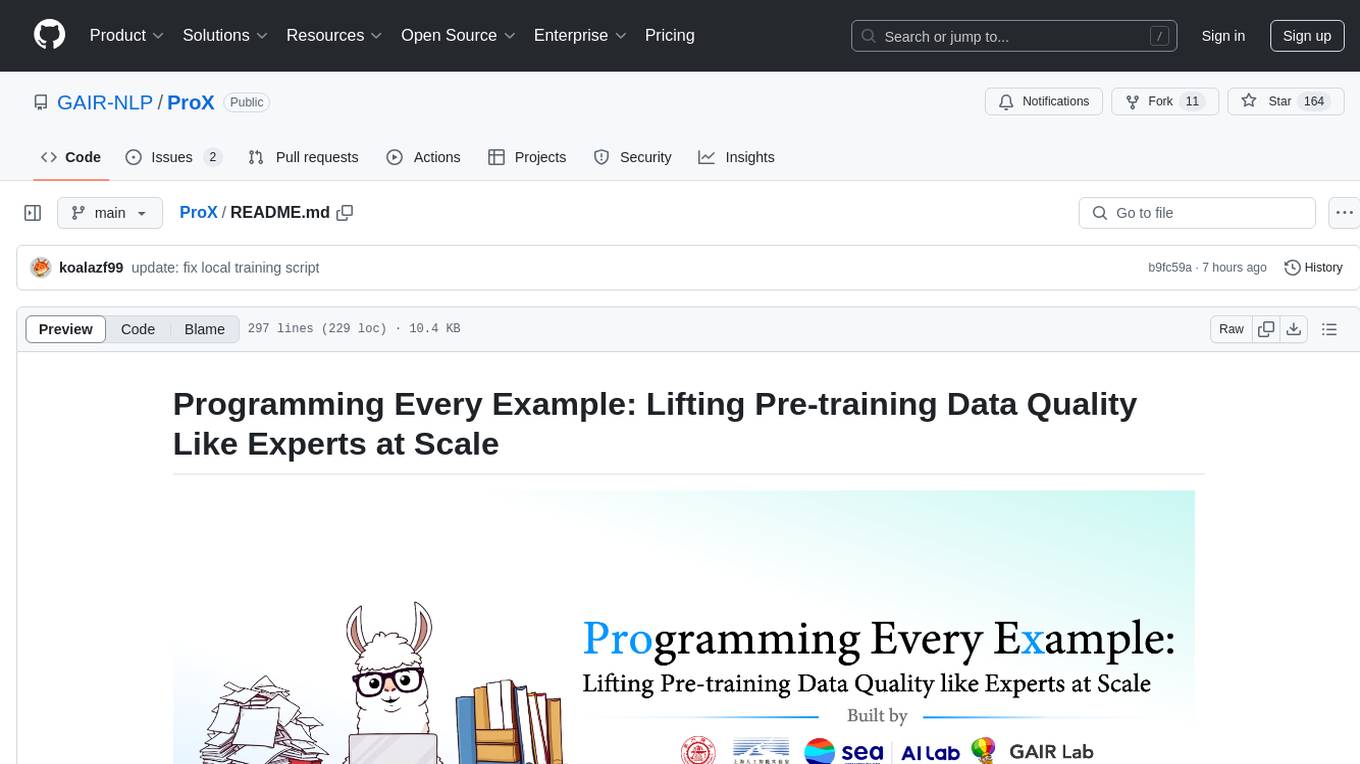
ProX is a lm-based data refinement framework that automates the process of cleaning and improving data used in pre-training large language models. It offers better performance, domain flexibility, efficiency, and cost-effectiveness compared to traditional methods. The framework has been shown to improve model performance by over 2% and boost accuracy by up to 20% in tasks like math. ProX is designed to refine data at scale without the need for manual adjustments, making it a valuable tool for data preprocessing in natural language processing tasks.
README:






- [10 October, 2024]: 🎉 We release the codebase for large scale data refining, together with the refining models on 🤗Huggingface: Prox-Refining-LMs.
- [19 September, 2024]: 🎉 We open-sourced pre-training corpus curated by our ProX framework, containing > 100B high quality general domain corpus and ~5B high quality math corpus, together with models(ProX and ProXMath) trained using these data.
🫐 ProX is a lm-based data refinement framework to improve the quality of data used in pre-training large language models. Instead of relying on human experts to create rules, ProX treats data refinement like a programming task. This allows models to automatically clean and improve each data example at a large scale.
Currently, 🫐 ProX curated data have gone through 2 levels of programming + executing: doc-level and chunk-level:
 Key Features:
Key Features:
- Better Performance: Models trained with ProX-refined data perform over 2% better than those trained with raw or rule-based data.
- Domain Flexibility: 🫐 ProX works well across different domains, boosting accuracy by up to 20% in tasks like math, without needing special manual adjustments.
- Efficient and Scalable: Even small models (as little as 0.3B parameters) can refine data effectively, similar to human experts, saving resources compared to LLM-based data synthesis.
- Cost-Effective: In general, 🫐 ProX could significantly save on training computing while maintaining strong results.
First, we have to install all the libraries listed in requirements.txt
git clone https://github.com/GAIR-NLP/ProX.git prox
cd prox
conda create -n prox python=3.10
conda activate prox
pip install -r requirements.txtFor acceleration, we need to install flash-attention with some fused kernels:
Click me
pip install flash-attn --no-build-isolation
# this part is quite similar to TinyLlama repo
# you can also refer to its detailed guide at: https://github.com/jzhang38/TinyLlama/blob/main/PRETRAIN.md
git clone https://github.com/Dao-AILab/flash-attention.git
cd flash-attention
cd csrc/rotary && pip install .
cd ../layer_norm && pip install .
cd ../xentropy && pip install .
cd ../.. && rm -rf flash-attentionThen, we can install lighteval & math-eval for evaluation
lighteval
conda create -n lmeval python=3.10
git clone https://github.com/huggingface/lighteval.git
cd lighteval
pip install -e .math-eval
git clone https://github.com/GAIR-NLP/math-evaluation-harness.git
cd math-evaluation-harness
conda create -n math_eval python=3.10
conda activate math_eval
pip install -r requirements.txtIf you want to refine your own data with ProX, please make sure you setup a new environment.
# create a new conda env
conda create -n refining python=3.10
conda activate refining
# install requirements
pip install -r refining_requirements.txtWe released 2 families of refining models:
- WebRefining-LM: for general web domain, including web-doc-refining-lm and web-chunk-refining-lm
- MathRefining-LM: for math domain, including math-doc-refining-lm and math-chunk-refining-lm
You can refer to the following example slurm scripts to refine large scale pre-training data.
# 1. doc-level refining
sbatch scripts/data_gen/example_doc_refining.sh
# 2. chunk-level refining
sbatch scripts/data_gen/example_chunk_refining.shWe provide over 100B high quality general domain corpus and ~5B high quality math corpus. You can directly train your own model using these data.
Here we provide an example to download, tokenize, train a model using 🫐 ProX data with litgpt, finally with thorough evaluation. Feel free to modify the script to fit your own needs.
First step is to setup your environment variables:
# 1. using setup_personal_env and setup_common_env
source setup_personal_env.sh
source setup_common_env.shThen you can download the data, and tokenize the data
# 2. download the data, e.g., RedPajama-pro
python scripts/data_download/hf_download.py \
--dataset_name gair-prox/RedPajama-pro
# 3. tokenize the data
export PYTHONPATH=$PYTHONPATH:$TINYLM_WORK_DIR/train
python -m train.data_tokenize.prepare_web \
--source_path $RAW_DATA_DIR/gair-prox/RedPajama-pro \
--tokenizer_path $TINYLM_WORK_DIR/vocab_files/llama_hf \
--destination_path $TOKENIZE_DATA_DIR/RedPajama-pro/llama \
--split train \
--percentage 1.0You should see many ".bin" files in the destination path. Then you can train a model using the tokenized data.
We run the training script using slurm:
# 4. train / convert / evaluate using slurm + multiple nodes
sbatch scripts/train/tlm/pt_tlm_xs_redpj_prox.shYou can also run the training script in one local node 👇
click me
# 4.1 train locally
cd train
export PYTHONPATH=$PYTHONPATH:$TINYLM_WORK_DIR/train
python -m pretrain.tinyllama \
--config_path $TINYLM_WORK_DIR/configs/general/<your_config>.yaml
# 4.2 convert to HF model
python -m scripts.weight_conversion.batch_model_conversion \
--litgpt_model_dir pt_llama_0_3b_redpj_25B_prox \ # the model dir you want to convert under ${$PT_MODEL_OUTPUT_DIR}
--hf_model_dir pt_llama_0_3b_redpj_25B_prox \ # the model dir you want to save under ${HF_MODEL_OUTPUT_DIR}
--save_token_interval 1 \ # the interval to save checkpoints, e.g., you can assume 1024 * 2048 * 500 approx. 1B token
--arch_name tiny_LLaMA_0_3b # the model architecture name in train/lit_gpt/config.pyWe evaluate the model using lighteval across 10 standard tasks:
- ARC (ARC-Easy, ARC-Challenge)
- CommonsenseQA
- Hellaswag
- MMLU
- OpenbookQA
- PIQA
- SocialIQA
- WinoGrande
- SciQ
Actually, in sbatch script, we have already included the evaluation part. You can also run the evaluation script if you are not using slurm:
# 5. evaluate the model
# we provide scripts for general evaluation
# e.g., you only want to eval last checkpoint named as `25B`
# you can simply remove `--model_step_list 25` to evaluate all checkpoints
python -m scripts.eval.base_evaluation \
--hf_model_dir pt_llama_0_3b_redpj_25B_prox \
--task_impl lighteval \
--task_set fineweb \
--model_step_list 25For math evaluation, you can refer to the following script, after you have installed math-eval and converted the model to HF format:
# alter the work dir and activate the conda env
cd math-evaluation-harness
conda activate math_eval
# eval on all benchmarks
bash auto_dir_run.sh ${your_model_folder_path}
# summarize all results of all intermediate ckpts in your_model_folder_path
python gather_results.py --do_all_ckpts --dir_path outputs/${your_model_folder_path}Currently, we release the following code and data:
- [✅] Data
- [✅] Training Code
- [✅] Evaluation Scripts
- [✅] Large Scale Data Refining
- [✅] Refining Model Weights
- [🚧] ...
Please cite 🫐 ProX paper if you find our work helpful:
@article{zhou2024programming,
title={Programming Every Example: Lifting Pre-training Data Quality like Experts at Scale},
author={Zhou, Fan and Wang, Zengzhi and Liu, Qian and Li, Junlong and Liu, Pengfei},
journal={arXiv preprint arXiv:2409.17115},
year={2024}
}We thank the following projects that provide great help for this work:
For Tasks:
Click tags to check more tools for each tasksFor Jobs:
Alternative AI tools for ProX
Similar Open Source Tools

ProX
ProX is a lm-based data refinement framework that automates the process of cleaning and improving data used in pre-training large language models. It offers better performance, domain flexibility, efficiency, and cost-effectiveness compared to traditional methods. The framework has been shown to improve model performance by over 2% and boost accuracy by up to 20% in tasks like math. ProX is designed to refine data at scale without the need for manual adjustments, making it a valuable tool for data preprocessing in natural language processing tasks.

Biomni
Biomni is a general-purpose biomedical AI agent designed to autonomously execute a wide range of research tasks across diverse biomedical subfields. By integrating cutting-edge large language model (LLM) reasoning with retrieval-augmented planning and code-based execution, Biomni helps scientists dramatically enhance research productivity and generate testable hypotheses.
Pixel-Reasoner
Pixel Reasoner is a framework that introduces reasoning in the pixel-space for Vision-Language Models (VLMs), enabling them to directly inspect, interrogate, and infer from visual evidences. This enhances reasoning fidelity for visual tasks by equipping VLMs with visual reasoning operations like zoom-in and select-frame. The framework addresses challenges like model's imbalanced competence and reluctance to adopt pixel-space operations through a two-phase training approach involving instruction tuning and curiosity-driven reinforcement learning. With these visual operations, VLMs can interact with complex visual inputs such as images or videos to gather necessary information, leading to improved performance across visual reasoning benchmarks.
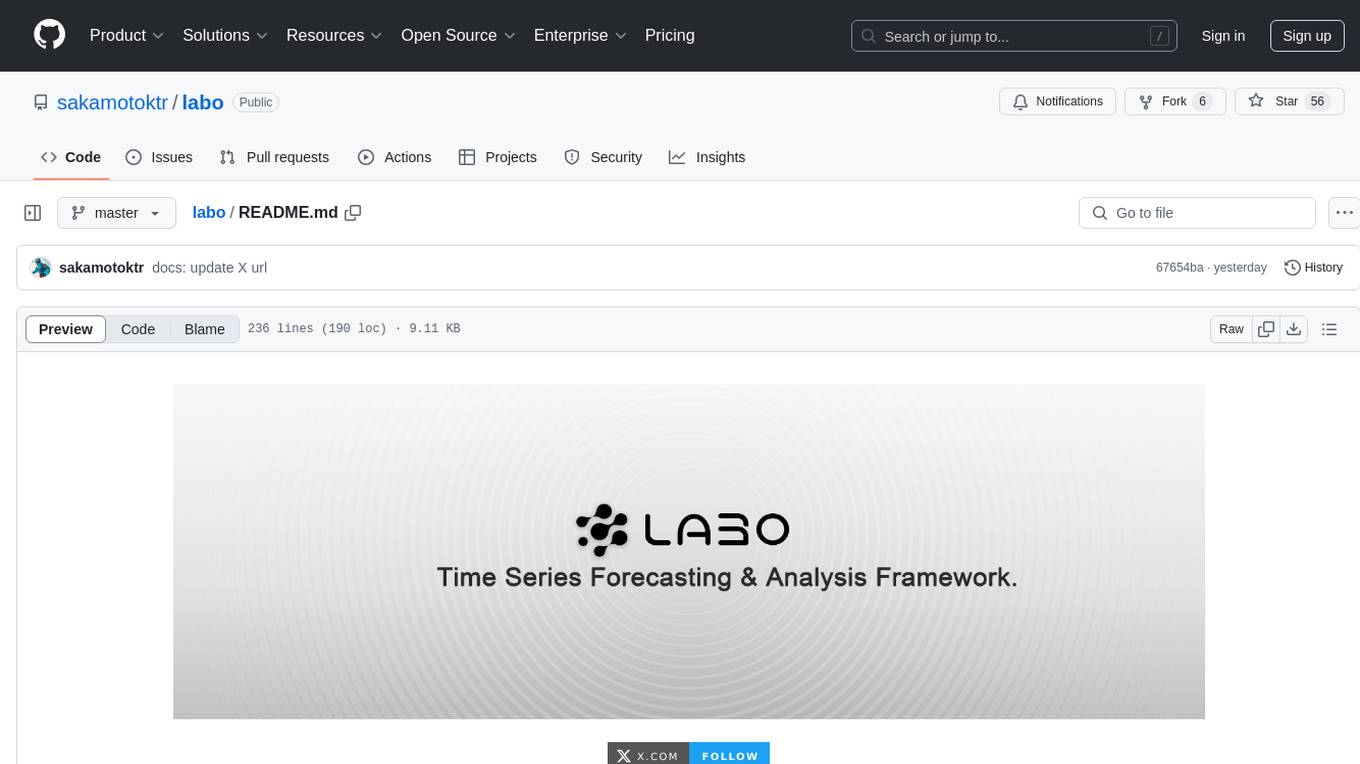
labo
LABO is a time series forecasting and analysis framework that integrates pre-trained and fine-tuned LLMs with multi-domain agent-based systems. It allows users to create and tune agents easily for various scenarios, such as stock market trend prediction and web public opinion analysis. LABO requires a specific runtime environment setup, including system requirements, Python environment, dependency installations, and configurations. Users can fine-tune their own models using LABO's Low-Rank Adaptation (LoRA) for computational efficiency and continuous model updates. Additionally, LABO provides a Python library for building model training pipelines and customizing agents for specific tasks.

BentoML
BentoML is an open-source model serving library for building performant and scalable AI applications with Python. It comes with everything you need for serving optimization, model packaging, and production deployment.
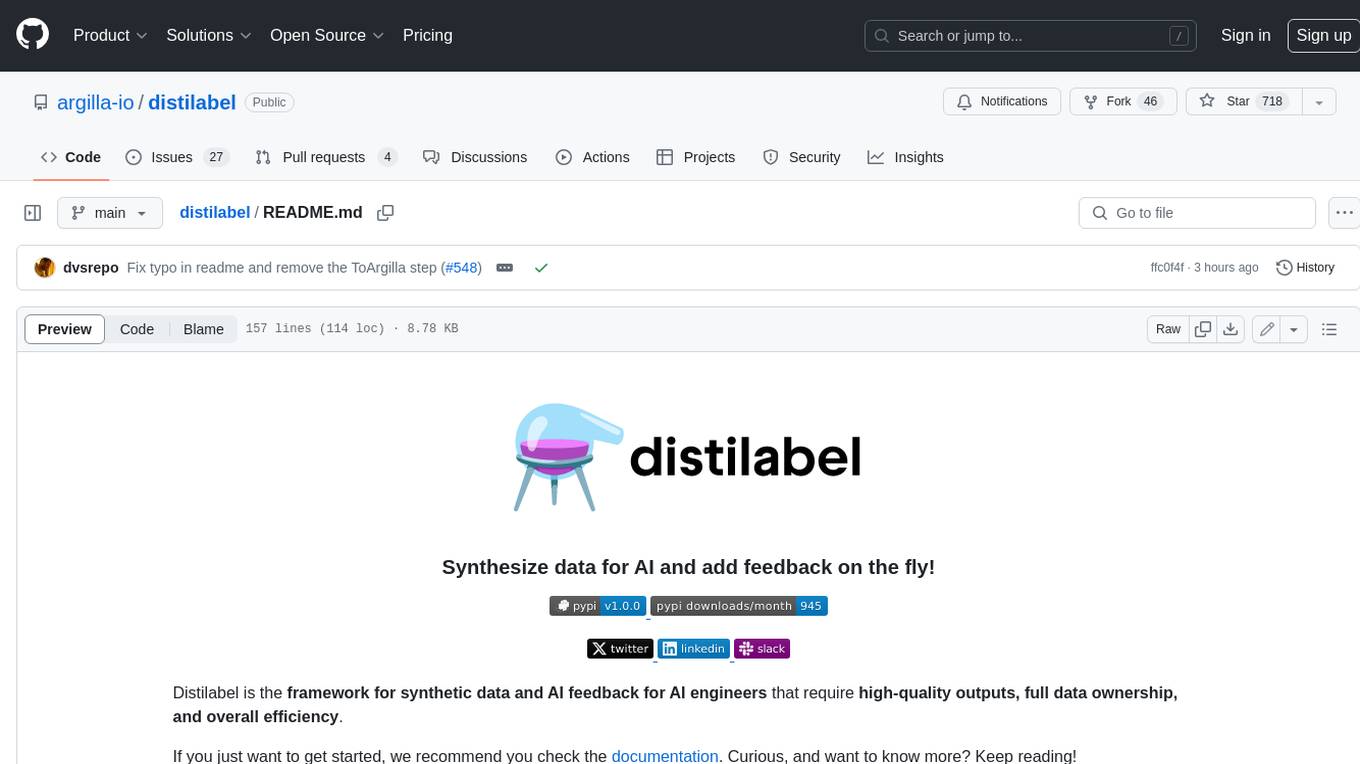
distilabel
Distilabel is a framework for synthetic data and AI feedback for AI engineers that require high-quality outputs, full data ownership, and overall efficiency. It helps you synthesize data and provide AI feedback to improve the quality of your AI models. With Distilabel, you can: * **Synthesize data:** Generate synthetic data to train your AI models. This can help you to overcome the challenges of data scarcity and bias. * **Provide AI feedback:** Get feedback from AI models on your data. This can help you to identify errors and improve the quality of your data. * **Improve your AI output quality:** By using Distilabel to synthesize data and provide AI feedback, you can improve the quality of your AI models and get better results.

deepeval
DeepEval is a simple-to-use, open-source LLM evaluation framework specialized for unit testing LLM outputs. It incorporates various metrics such as G-Eval, hallucination, answer relevancy, RAGAS, etc., and runs locally on your machine for evaluation. It provides a wide range of ready-to-use evaluation metrics, allows for creating custom metrics, integrates with any CI/CD environment, and enables benchmarking LLMs on popular benchmarks. DeepEval is designed for evaluating RAG and fine-tuning applications, helping users optimize hyperparameters, prevent prompt drifting, and transition from OpenAI to hosting their own Llama2 with confidence.
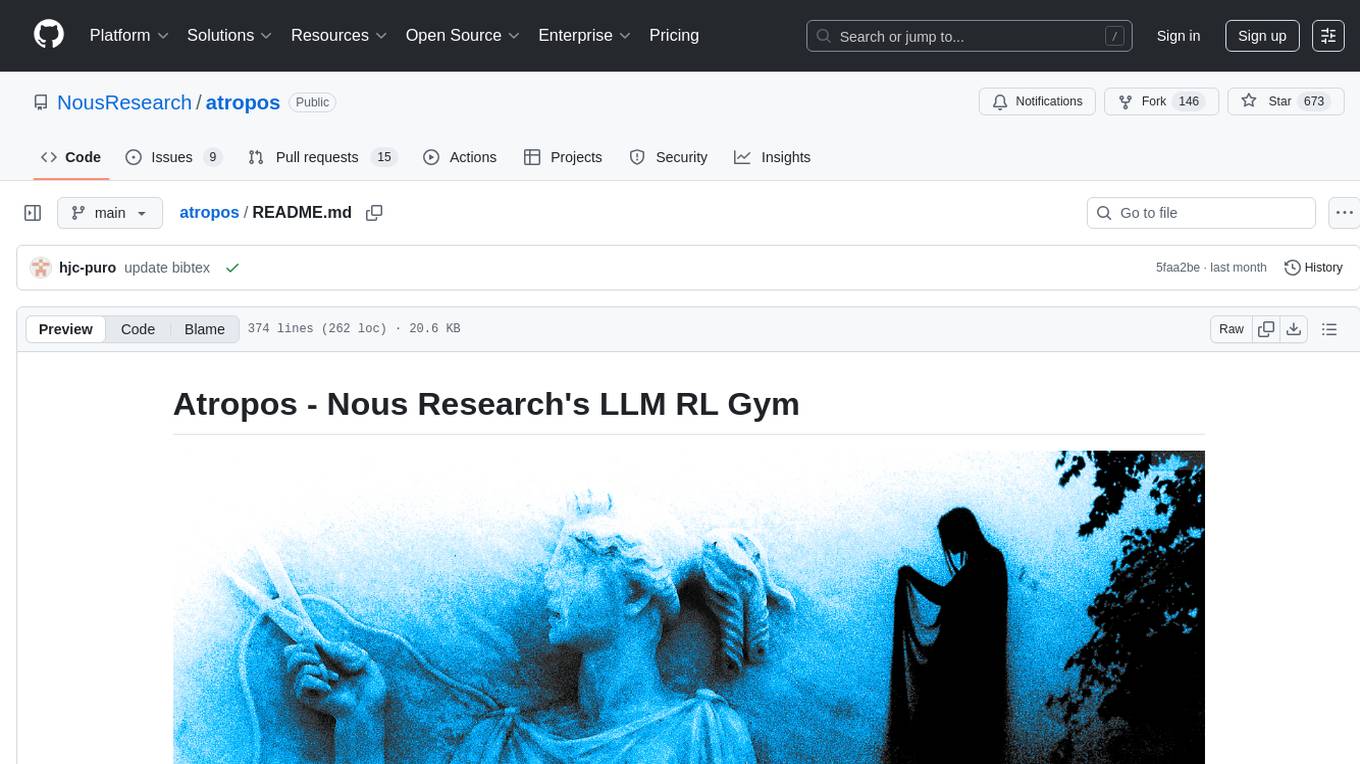
atropos
Atropos is a robust and scalable framework for Reinforcement Learning Environments with Large Language Models (LLMs). It provides a flexible platform to accelerate LLM-based RL research across diverse interactive settings. Atropos supports multi-turn and asynchronous RL interactions, integrates with various inference APIs, offers a standardized training interface for experimenting with different RL algorithms, and allows for easy scalability by launching more environment instances. The framework manages diverse environment types concurrently for heterogeneous, multi-modal training.
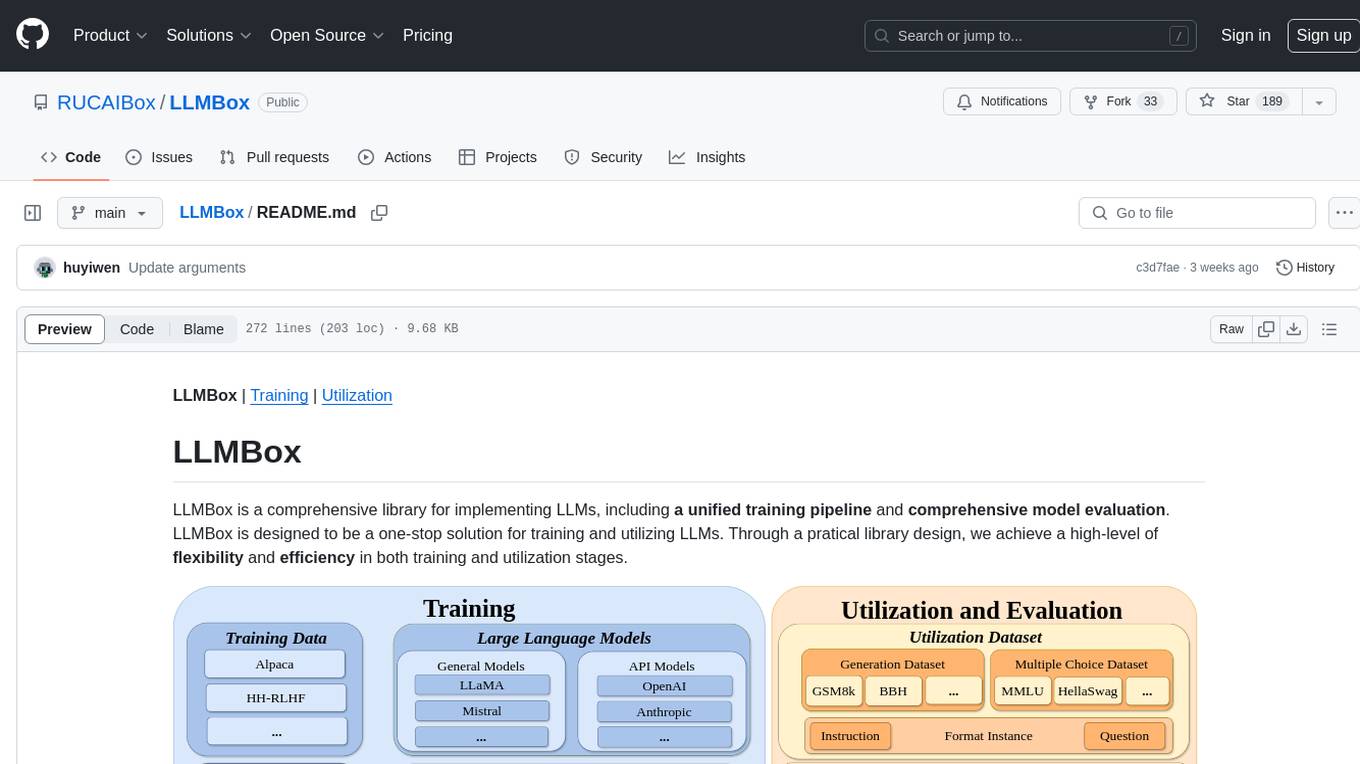
LLMBox
LLMBox is a comprehensive library designed for implementing Large Language Models (LLMs) with a focus on a unified training pipeline and comprehensive model evaluation. It serves as a one-stop solution for training and utilizing LLMs, offering flexibility and efficiency in both training and utilization stages. The library supports diverse training strategies, comprehensive datasets, tokenizer vocabulary merging, data construction strategies, parameter efficient fine-tuning, and efficient training methods. For utilization, LLMBox provides comprehensive evaluation on various datasets, in-context learning strategies, chain-of-thought evaluation, evaluation methods, prefix caching for faster inference, support for specific LLM models like vLLM and Flash Attention, and quantization options. The tool is suitable for researchers and developers working with LLMs for natural language processing tasks.
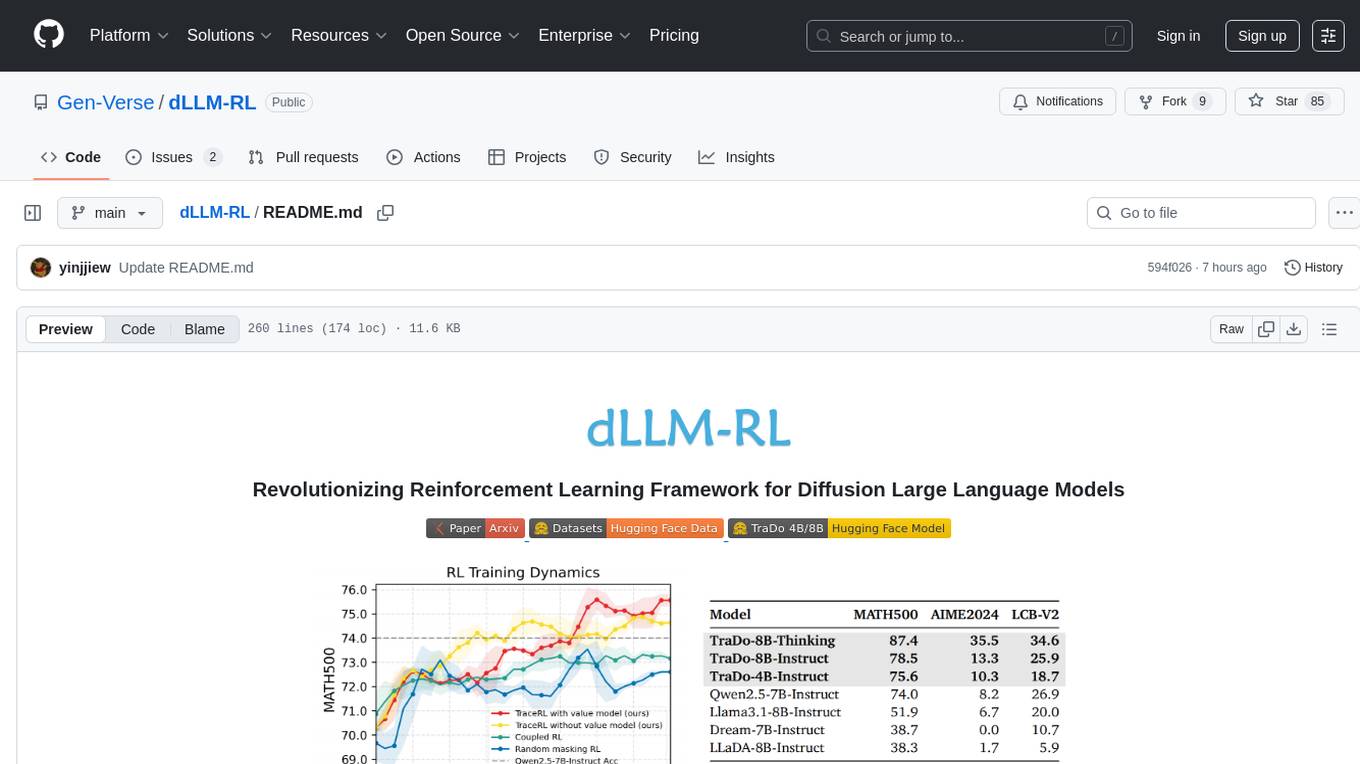
dLLM-RL
dLLM-RL is a revolutionary reinforcement learning framework designed for Diffusion Large Language Models. It supports various models with diverse structures, offers inference acceleration, RL training capabilities, and SFT functionalities. The tool introduces TraceRL for trajectory-aware RL and diffusion-based value models for optimization stability. Users can download and try models like TraDo-4B-Instruct and TraDo-8B-Instruct. The tool also provides support for multi-node setups and easy building of reinforcement learning methods. Additionally, it offers supervised fine-tuning strategies for different models and tasks.

deep-research
Deep Research is a lightning-fast tool that uses powerful AI models to generate comprehensive research reports in just a few minutes. It leverages advanced 'Thinking' and 'Task' models, combined with an internet connection, to provide fast and insightful analysis on various topics. The tool ensures privacy by processing and storing all data locally. It supports multi-platform deployment, offers support for various large language models, web search functionality, knowledge graph generation, research history preservation, local and server API support, PWA technology, multi-key payload support, multi-language support, and is built with modern technologies like Next.js and Shadcn UI. Deep Research is open-source under the MIT License.
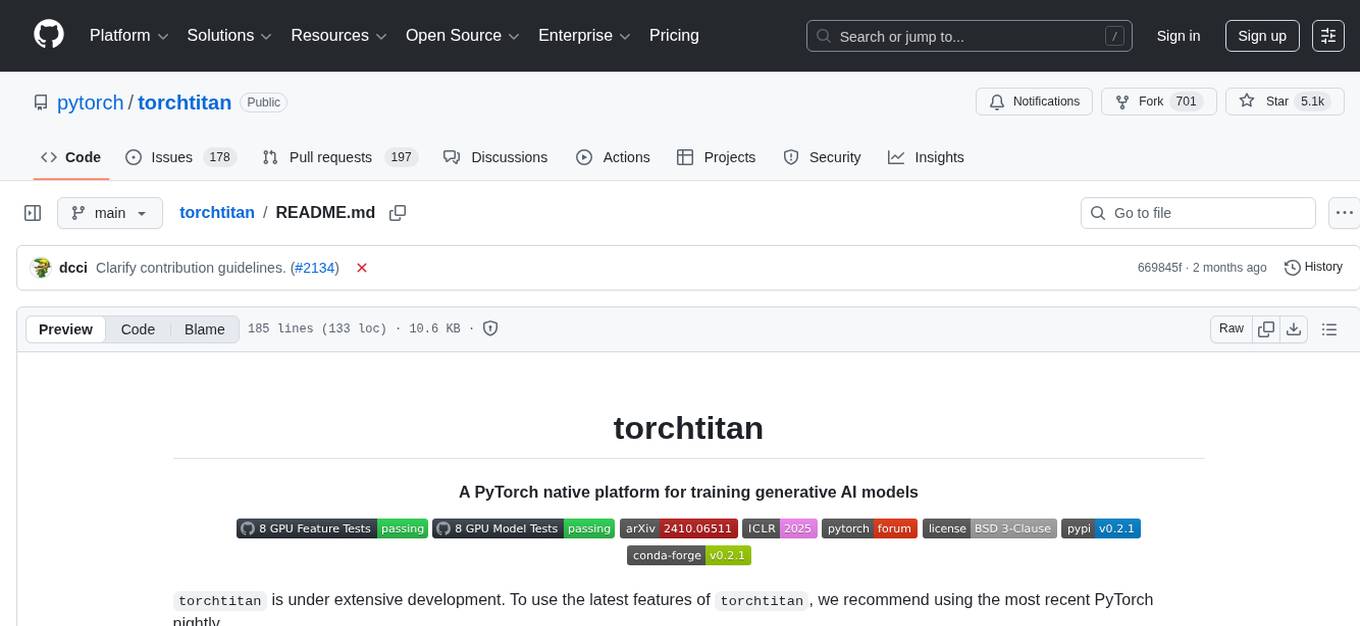
torchtitan
Torchtitan is a PyTorch native platform designed for rapid experimentation and large-scale training of generative AI models. It provides a flexible foundation for developers to build upon with extension points for creating custom extensions. The tool showcases PyTorch's latest distributed training features and supports pretraining Llama 3.1 LLMs of various sizes. It offers key features like multi-dimensional parallelisms, FSDP2 with per-parameter sharding, Tensor Parallel, Pipeline Parallel, and more. Users can contribute to the tool through the experiments folder and core contributions guidelines. Installation can be done from source, nightly builds, or stable releases. The tool also supports training Llama 3.1 models and provides guidance on starting a training run and multi-node training. Citation information is available for referencing the tool in academic work, and the source code is under a BSD 3 license.
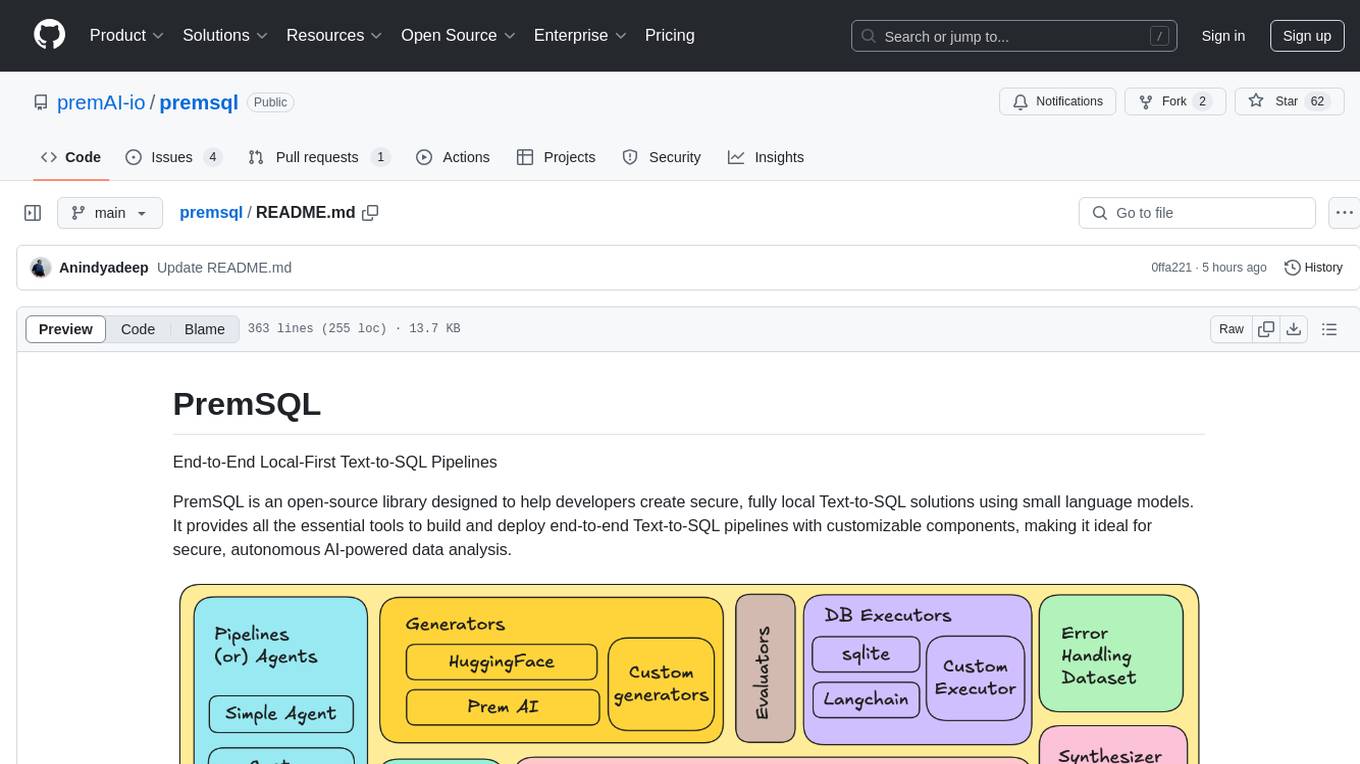
premsql
PremSQL is an open-source library designed to help developers create secure, fully local Text-to-SQL solutions using small language models. It provides essential tools for building and deploying end-to-end Text-to-SQL pipelines with customizable components, ideal for secure, autonomous AI-powered data analysis. The library offers features like Local-First approach, Customizable Datasets, Robust Executors and Evaluators, Advanced Generators, Error Handling and Self-Correction, Fine-Tuning Support, and End-to-End Pipelines. Users can fine-tune models, generate SQL queries from natural language inputs, handle errors, and evaluate model performance against predefined metrics. PremSQL is extendible for customization and private data usage.
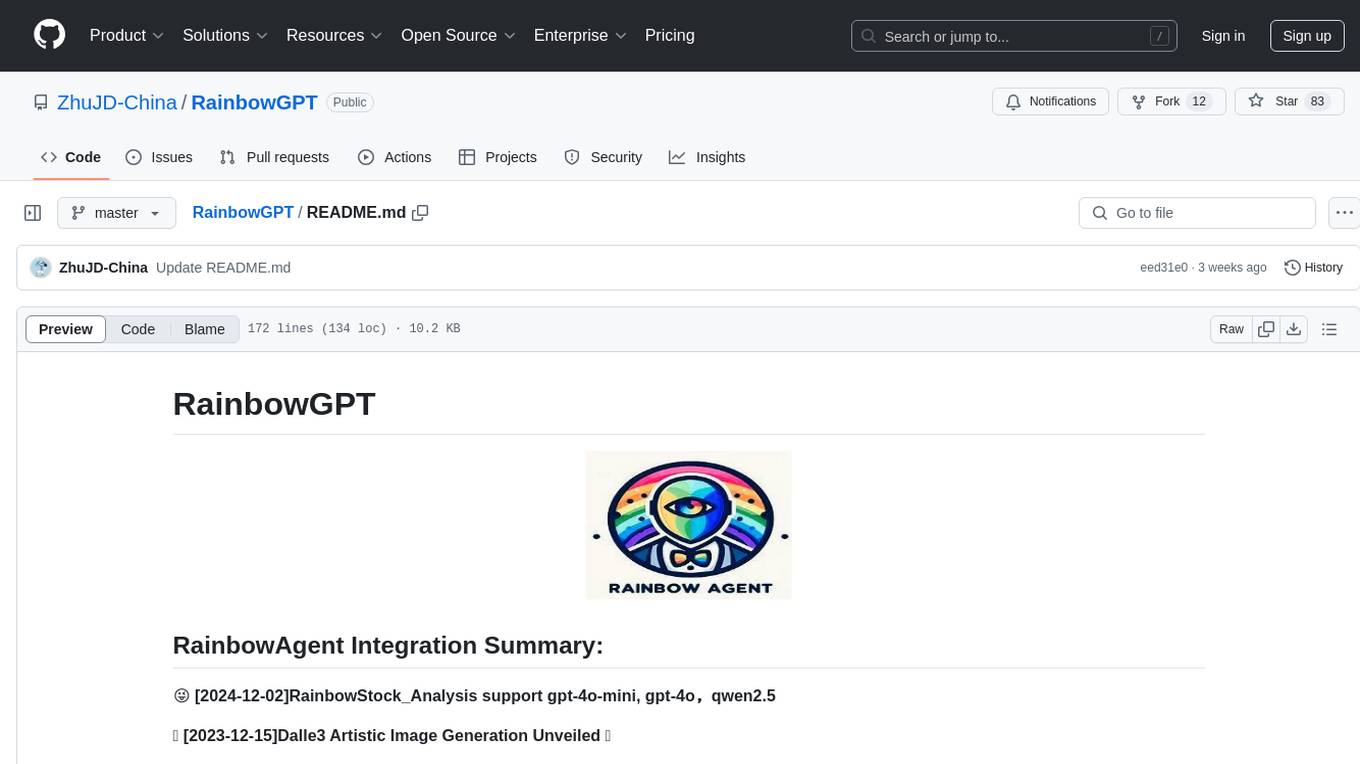
RainbowGPT
RainbowGPT is a versatile tool that offers a range of functionalities, including Stock Analysis for financial decision-making, MySQL Management for database navigation, and integration of AI technologies like GPT-4 and ChatGlm3. It provides a user-friendly interface suitable for all skill levels, ensuring seamless information flow and continuous expansion of emerging technologies. The tool enhances adaptability, creativity, and insight, making it a valuable asset for various projects and tasks.
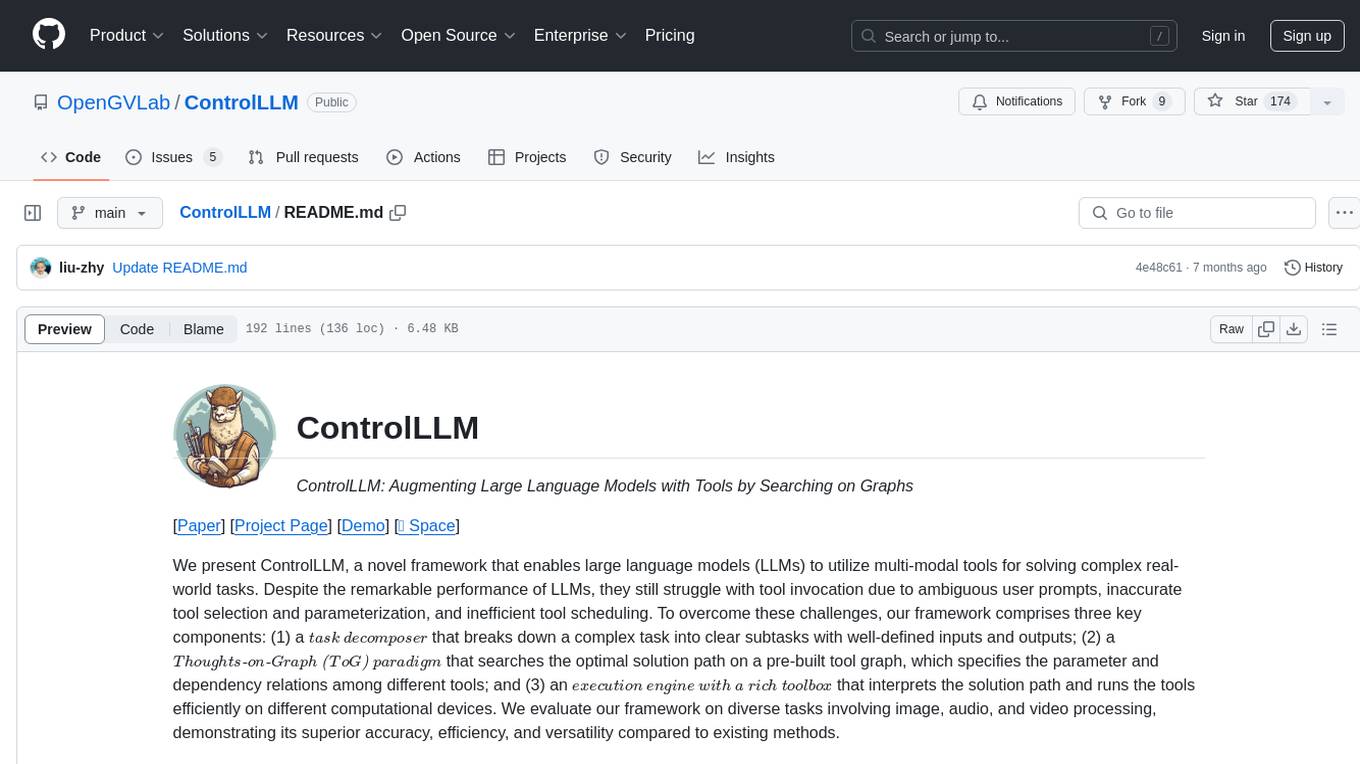
ControlLLM
ControlLLM is a framework that empowers large language models to leverage multi-modal tools for solving complex real-world tasks. It addresses challenges like ambiguous user prompts, inaccurate tool selection, and inefficient tool scheduling by utilizing a task decomposer, a Thoughts-on-Graph paradigm, and an execution engine with a rich toolbox. The framework excels in tasks involving image, audio, and video processing, showcasing superior accuracy, efficiency, and versatility compared to existing methods.
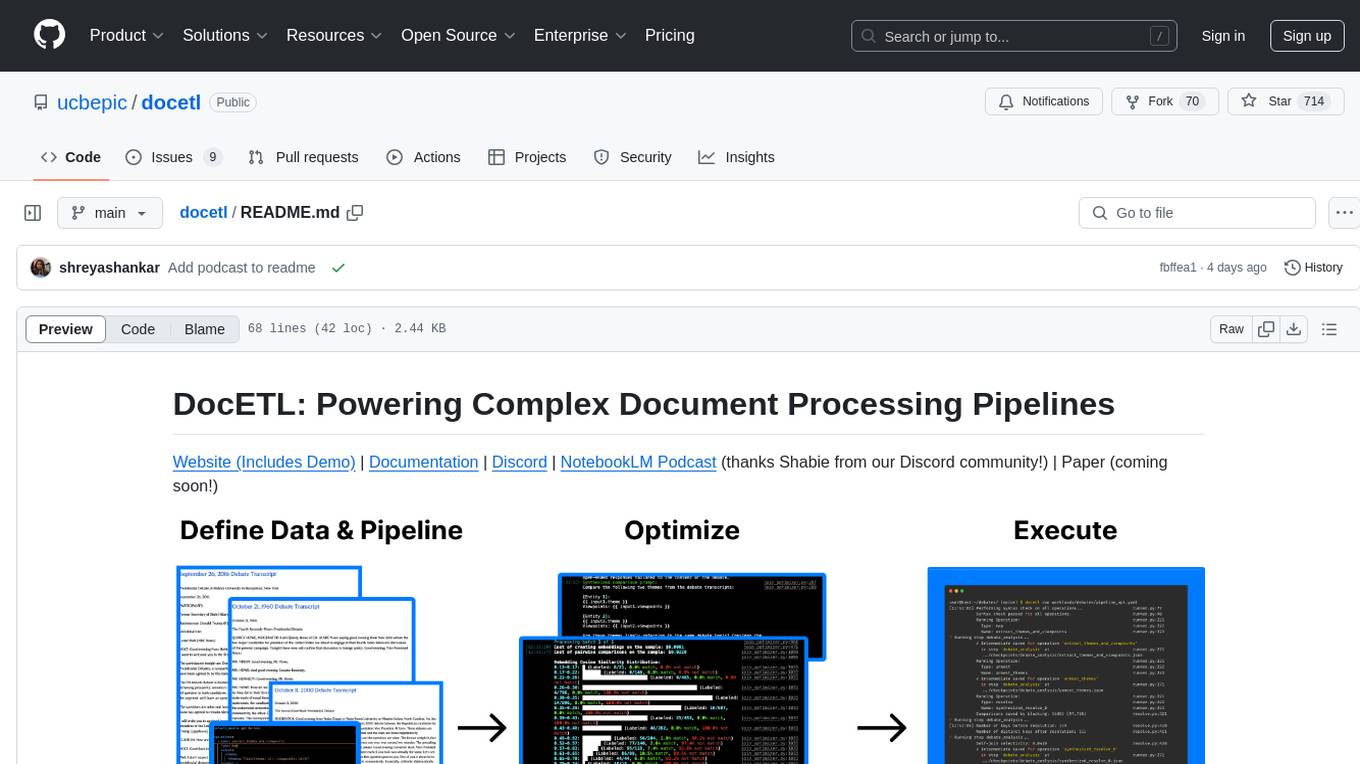
docetl
DocETL is a tool for creating and executing data processing pipelines, especially suited for complex document processing tasks. It offers a low-code, declarative YAML interface to define LLM-powered operations on complex data. Ideal for maximizing correctness and output quality for semantic processing on a collection of data, representing complex tasks via map-reduce, maximizing LLM accuracy, handling long documents, and automating task retries based on validation criteria.
For similar tasks

ProX
ProX is a lm-based data refinement framework that automates the process of cleaning and improving data used in pre-training large language models. It offers better performance, domain flexibility, efficiency, and cost-effectiveness compared to traditional methods. The framework has been shown to improve model performance by over 2% and boost accuracy by up to 20% in tasks like math. ProX is designed to refine data at scale without the need for manual adjustments, making it a valuable tool for data preprocessing in natural language processing tasks.
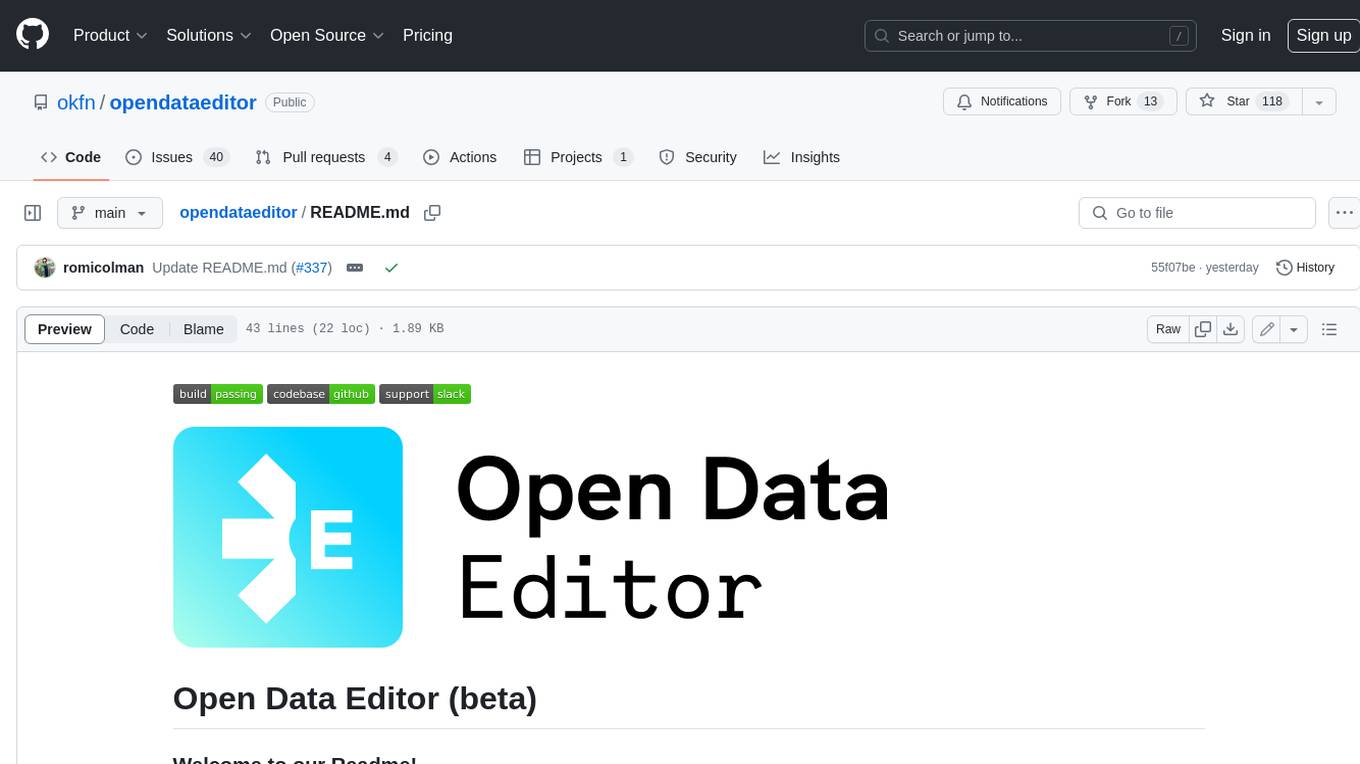
opendataeditor
The Open Data Editor (ODE) is a no-code application to explore, validate and publish data in a simple way. It is an open source project powered by the Frictionless Framework. The ODE is currently available for download and testing in beta.
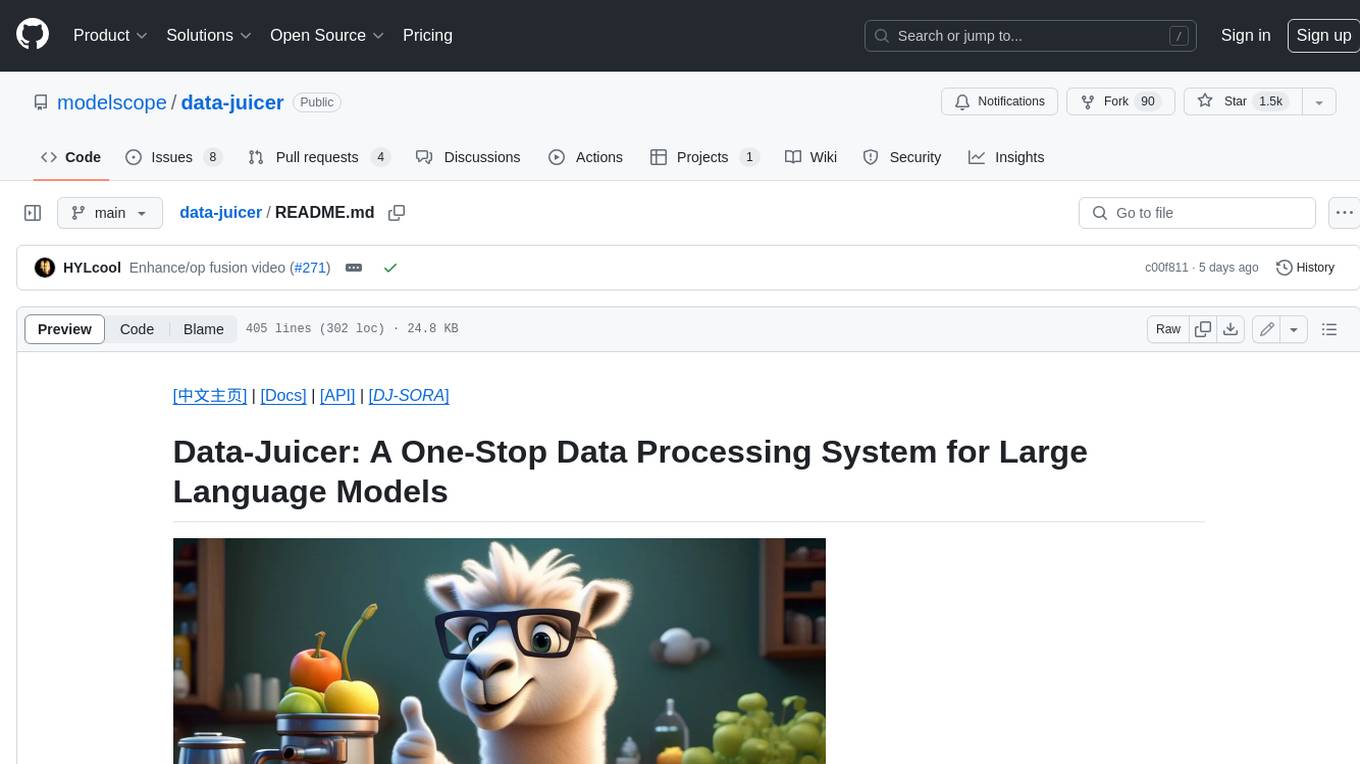
data-juicer
Data-Juicer is a one-stop data processing system to make data higher-quality, juicier, and more digestible for LLMs. It is a systematic & reusable library of 80+ core OPs, 20+ reusable config recipes, and 20+ feature-rich dedicated toolkits, designed to function independently of specific LLM datasets and processing pipelines. Data-Juicer allows detailed data analyses with an automated report generation feature for a deeper understanding of your dataset. Coupled with multi-dimension automatic evaluation capabilities, it supports a timely feedback loop at multiple stages in the LLM development process. Data-Juicer offers tens of pre-built data processing recipes for pre-training, fine-tuning, en, zh, and more scenarios. It provides a speedy data processing pipeline requiring less memory and CPU usage, optimized for maximum productivity. Data-Juicer is flexible & extensible, accommodating most types of data formats and allowing flexible combinations of OPs. It is designed for simplicity, with comprehensive documentation, easy start guides and demo configs, and intuitive configuration with simple adding/removing OPs from existing configs.
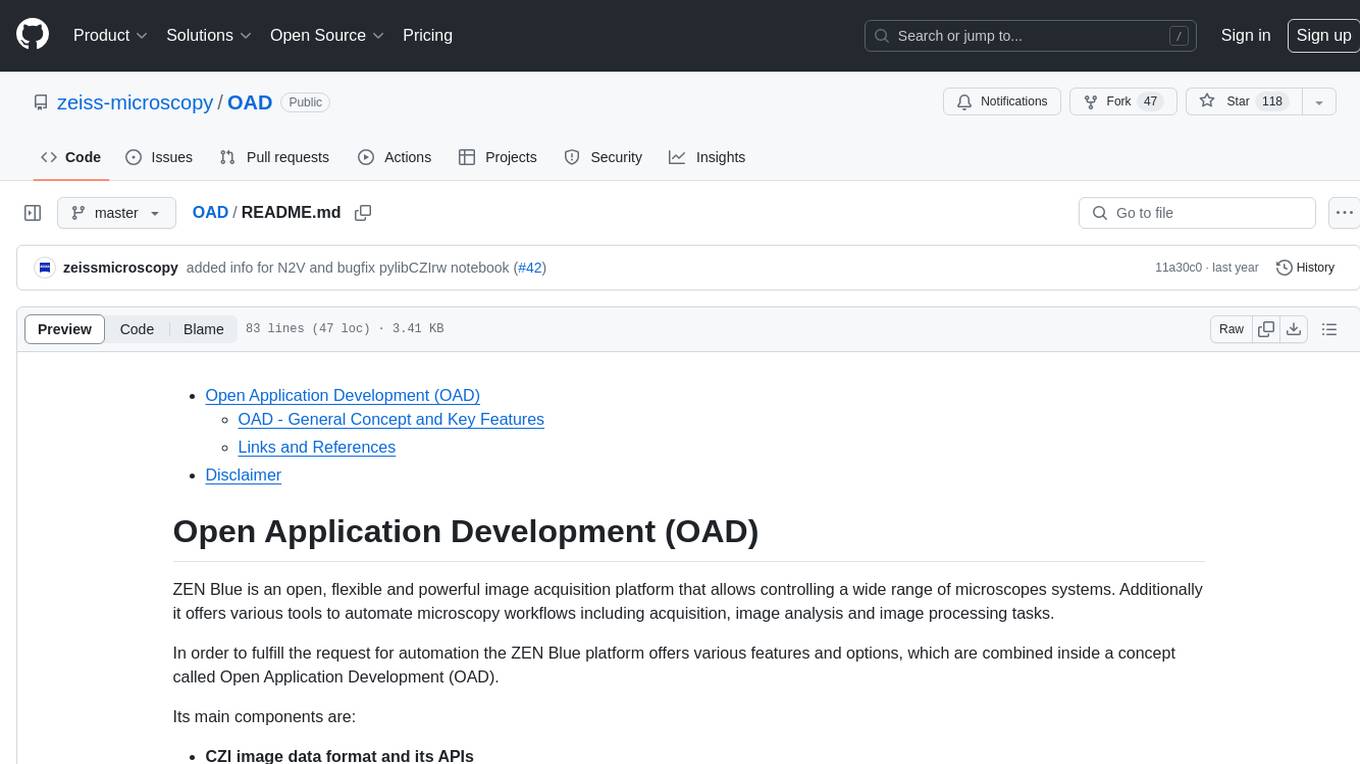
OAD
OAD is a powerful open-source tool for analyzing and visualizing data. It provides a user-friendly interface for exploring datasets, generating insights, and creating interactive visualizations. With OAD, users can easily import data from various sources, clean and preprocess data, perform statistical analysis, and create customizable visualizations to communicate findings effectively. Whether you are a data scientist, analyst, or researcher, OAD can help you streamline your data analysis workflow and uncover valuable insights from your data.
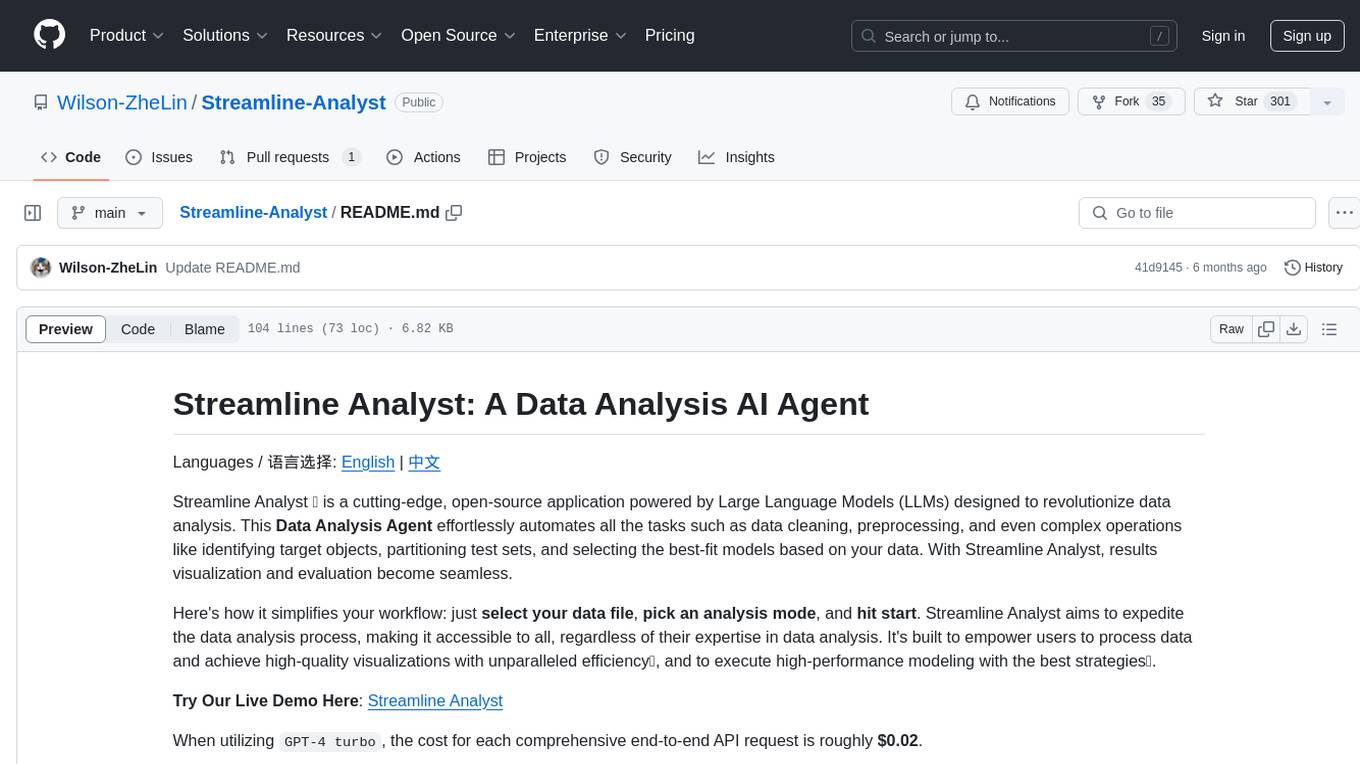
Streamline-Analyst
Streamline Analyst is a cutting-edge, open-source application powered by Large Language Models (LLMs) designed to revolutionize data analysis. This Data Analysis Agent effortlessly automates tasks such as data cleaning, preprocessing, and complex operations like identifying target objects, partitioning test sets, and selecting the best-fit models based on your data. With Streamline Analyst, results visualization and evaluation become seamless. It aims to expedite the data analysis process, making it accessible to all, regardless of their expertise in data analysis. The tool is built to empower users to process data and achieve high-quality visualizations with unparalleled efficiency, and to execute high-performance modeling with the best strategies. Future enhancements include Natural Language Processing (NLP), neural networks, and object detection utilizing YOLO, broadening its capabilities to meet diverse data analysis needs.
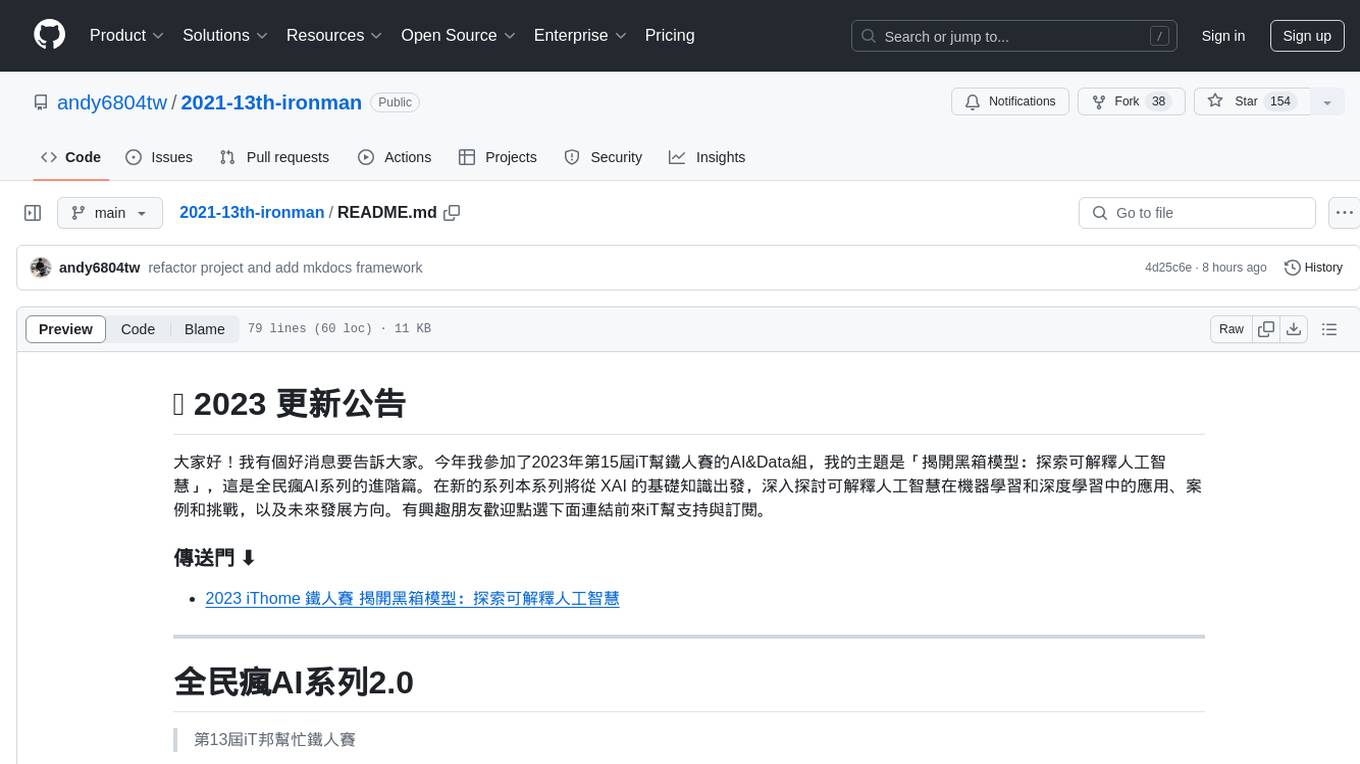
2021-13th-ironman
This repository is a part of the 13th iT Help Ironman competition, focusing on exploring explainable artificial intelligence (XAI) in machine learning and deep learning. The content covers the basics of XAI, its applications, cases, challenges, and future directions. It also includes practical machine learning algorithms, model deployment, and integration concepts. The author aims to provide detailed resources on AI and share knowledge with the audience through this competition.
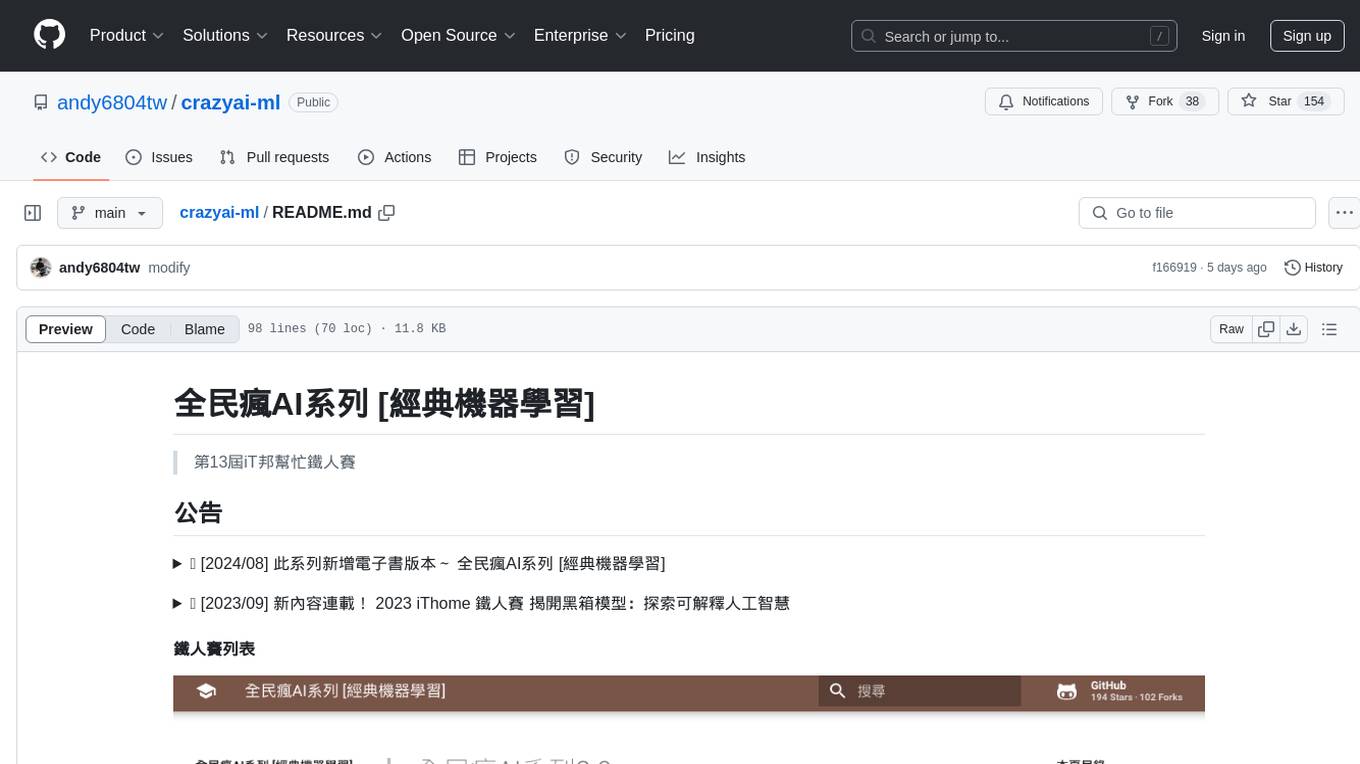
crazyai-ml
The 'crazyai-ml' repository is a collection of resources related to machine learning, specifically focusing on explaining artificial intelligence models. It includes articles, code snippets, and tutorials covering various machine learning algorithms, data analysis, model training, and deployment. The content aims to provide a comprehensive guide for beginners in the field of AI, offering practical implementations and insights into popular machine learning packages and model tuning techniques. The repository also addresses the integration of AI models and frontend-backend concepts, making it a valuable resource for individuals interested in AI applications.
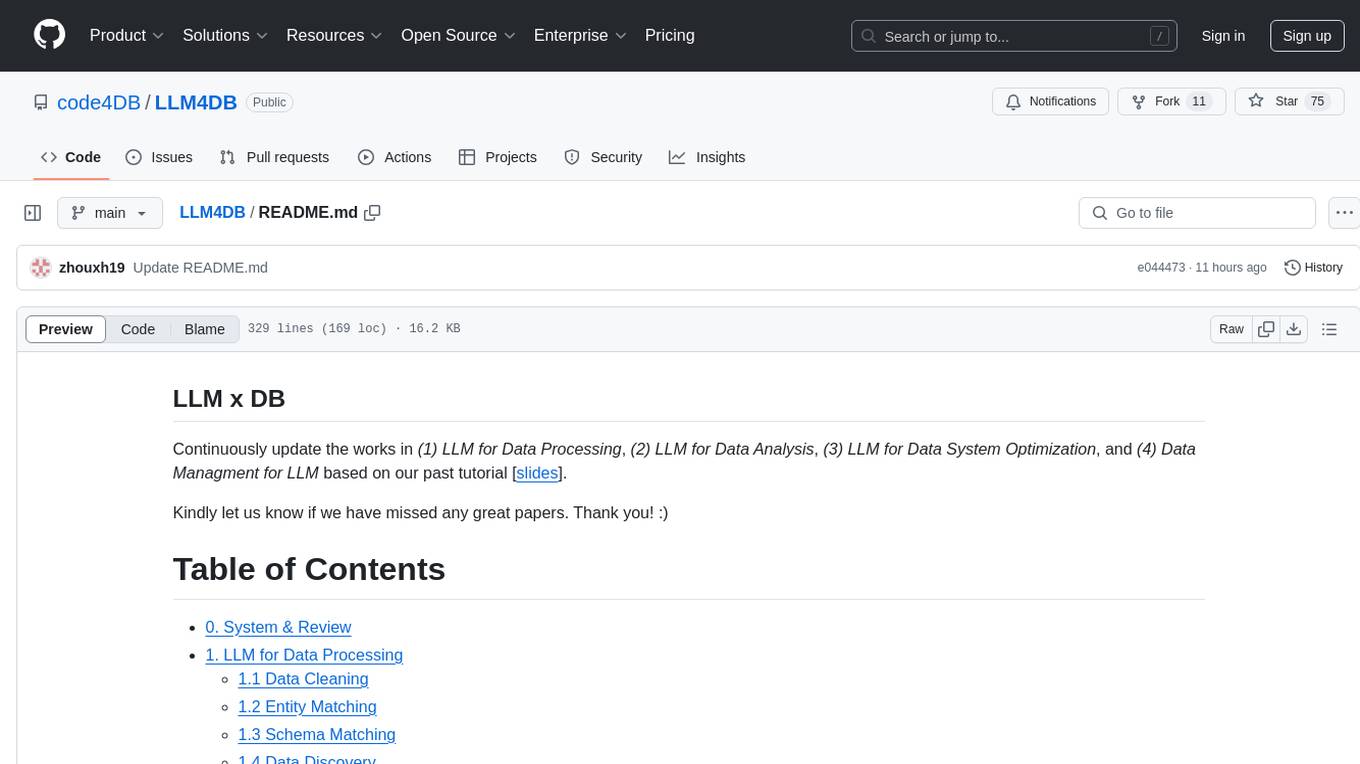
LLM4DB
LLM4DB is a repository focused on the intersection of Large Language Models (LLMs) and Database technologies. It covers various aspects such as data processing, data analysis, database optimization, and data management for LLMs. The repository includes research papers, tools, and techniques related to leveraging LLMs for tasks like data cleaning, entity matching, schema matching, data discovery, NL2SQL, data exploration, data visualization, knob tuning, query optimization, and database diagnosis.
For similar jobs

sweep
Sweep is an AI junior developer that turns bugs and feature requests into code changes. It automatically handles developer experience improvements like adding type hints and improving test coverage.

teams-ai
The Teams AI Library is a software development kit (SDK) that helps developers create bots that can interact with Teams and Microsoft 365 applications. It is built on top of the Bot Framework SDK and simplifies the process of developing bots that interact with Teams' artificial intelligence capabilities. The SDK is available for JavaScript/TypeScript, .NET, and Python.

ai-guide
This guide is dedicated to Large Language Models (LLMs) that you can run on your home computer. It assumes your PC is a lower-end, non-gaming setup.

classifai
Supercharge WordPress Content Workflows and Engagement with Artificial Intelligence. Tap into leading cloud-based services like OpenAI, Microsoft Azure AI, Google Gemini and IBM Watson to augment your WordPress-powered websites. Publish content faster while improving SEO performance and increasing audience engagement. ClassifAI integrates Artificial Intelligence and Machine Learning technologies to lighten your workload and eliminate tedious tasks, giving you more time to create original content that matters.

chatbot-ui
Chatbot UI is an open-source AI chat app that allows users to create and deploy their own AI chatbots. It is easy to use and can be customized to fit any need. Chatbot UI is perfect for businesses, developers, and anyone who wants to create a chatbot.

BricksLLM
BricksLLM is a cloud native AI gateway written in Go. Currently, it provides native support for OpenAI, Anthropic, Azure OpenAI and vLLM. BricksLLM aims to provide enterprise level infrastructure that can power any LLM production use cases. Here are some use cases for BricksLLM: * Set LLM usage limits for users on different pricing tiers * Track LLM usage on a per user and per organization basis * Block or redact requests containing PIIs * Improve LLM reliability with failovers, retries and caching * Distribute API keys with rate limits and cost limits for internal development/production use cases * Distribute API keys with rate limits and cost limits for students

uAgents
uAgents is a Python library developed by Fetch.ai that allows for the creation of autonomous AI agents. These agents can perform various tasks on a schedule or take action on various events. uAgents are easy to create and manage, and they are connected to a fast-growing network of other uAgents. They are also secure, with cryptographically secured messages and wallets.

griptape
Griptape is a modular Python framework for building AI-powered applications that securely connect to your enterprise data and APIs. It offers developers the ability to maintain control and flexibility at every step. Griptape's core components include Structures (Agents, Pipelines, and Workflows), Tasks, Tools, Memory (Conversation Memory, Task Memory, and Meta Memory), Drivers (Prompt and Embedding Drivers, Vector Store Drivers, Image Generation Drivers, Image Query Drivers, SQL Drivers, Web Scraper Drivers, and Conversation Memory Drivers), Engines (Query Engines, Extraction Engines, Summary Engines, Image Generation Engines, and Image Query Engines), and additional components (Rulesets, Loaders, Artifacts, Chunkers, and Tokenizers). Griptape enables developers to create AI-powered applications with ease and efficiency.

